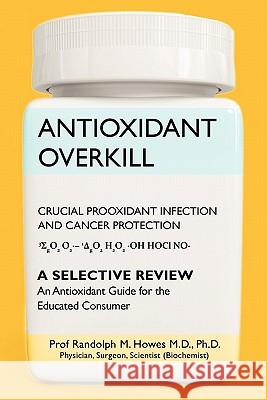Antioxidant Overkill: Crucial Prooxidant Infection and Cancer Protection » książka
Antioxidant Overkill: Crucial Prooxidant Infection and Cancer Protection
ISBN-13: 9781456547523 / Angielski / Miękka / 2011 / 428 str.
Antioxidants from supplements, food sources and the environment have a cumulative effect of dangerously lowering protective prooxidant levels, which "allows" for disease manifestation and coexistence of diseases. Today's marketing of antioxidants is all about sales and has nothing to do with science-based evidence. Scientific data has shown for years that the antioxidant vitamins can increase the risk of cancer, heart disease, stroke and overall mortality. Yet, this information is ignored or denied by those "pushing" these potentially harmful products. None of the synthetic antioxidants work in the same manner as those contained in the biochemical matrix of fruits and vegetables of a nutritious diet. Today's antioxidants should be treated as medicines, not just because of their claims, but because of their proven adverse effects on the human body. I present over 250 scientific studies showing the negligible or non-existent effects of the antioxidants and of these, 80 studies highlight their wide ranging harmful effects. This is the largest collection of its kind in the world's medical literature. The hype of the antioxidants was based on the invalidated and outdated free radical theory, which lacks predictability and fails to meet the requirements of the scientific method. As was pointed out in an article entitled, Antioxidants not heaven sent, by Stefan Andrei Anghel in the Harvard Science Review, Spring 2010, "It may come as a surprise that the current scientific consensus is that there is no health benefit to taking antioxidant supplements. Even more unexpected news came this year when an article announced that antioxidants may actually prevent the health-promoting effects of physical exercise.... If the model proposed by the authors of the study is correct, then it may turn out that we have been systematically "poisoning" ourselves, increasing our disease risk and shortening our lifespan through antioxidant supplements." It was especially gratifying that Anghel cited one of my papers entitled, The Free Radical Fantasy, as the first reference in The Harvard Review and cited it two other times in the article. On January 2 5, 2011, Sharon Begley noted in Newsweek magazine in an article entitled, Antioxidants fall from grace, that, "Now the research is challenging an even more fundamental tenet of the antioxidant craze. Many of the free radicals that are neutralized by antioxidants perform valuable functions in the body. The most important: fighting toxins (white blood cells churn out free radicals by the battalion to fight bacterial infection) and fighting cancer. Maybe it's not such a fabulous idea to flood the body with something that neutralizes these warriors of the immune system." Antioxidant overuse can be dangerous with health problems, like cancer or infections. In 2009, 108 new food products with antioxidants touted on the label reached store shelves, aisles of them in the United States. Shockingly, medical personnel and cancer survivors take more antioxidants than those taken by the average person. The theory behind the use of antioxidants is plausible only if the free radical theory is sound. But, it has been nullified by hundreds of studies. The theory has been wrong and that is the reason that the antioxidant supplements available to us lack effectiveness and produce adverse effects. The free radical theory is passe With this explanation, the American Heart Association's advisory statement is sound. There is no good reason, at this point, to spend your money on antioxidant supplements. I have endeavored to find more advanced and improved replacement theories. People are waking up to the fact that they have been victims of clever marketing campaigns, all of which were based on the profit motive. Stop being a victim while the antioxidant craze is dying down. More and more, people are becoming aware of their ineffectiveness and of their harm. The choice is yours. Choose w"
Zawartość książki może nie spełniać oczekiwań – reklamacje nie obejmują treści, która mogła nie być redakcyjnie ani merytorycznie opracowana.











